TESOL Goes to Washington 2023
by TESOL International Association
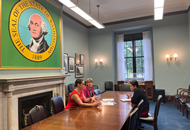 This June, more than 50 dedicated TESOLers took
their passion and voices to Capitol Hill to meet with their members of Congress
and advocate for the English language teaching (ELT) profession and the
multilingual learners of English (MLEs) they serve each and every day.
Presented with engaging sessions and the strength of networking, attendees of
TESOL’s 2023 Advocacy & Policy Summit brought to Congress not only
priorities within the federal budget and innovative legislation, but also the
stories and impact and promise of their campuses and communities.
This June, more than 50 dedicated TESOLers took
their passion and voices to Capitol Hill to meet with their members of Congress
and advocate for the English language teaching (ELT) profession and the
multilingual learners of English (MLEs) they serve each and every day.
Presented with engaging sessions and the strength of networking, attendees of
TESOL’s 2023 Advocacy & Policy Summit brought to Congress not only
priorities within the federal budget and innovative legislation, but also the
stories and impact and promise of their campuses and communities.
Summit attendees gathered near Georgetown on the 20th of June and were
greeted with policy and advocacy updates from several of TESOL’s colleague
associations throughout the day. Proudly sponsored by the American Federation of
Teachers, the Summit began with a U.S. Federal Policy Update, covering
the backdrop of the 118th Congress and legislative
priorities for this year’s Hill visits. On this panel were Deborah
Kennedy, executive director for the National Coalition for Literacy, and
Roxanne Garza, deputy director of education policy at UnidosUS.
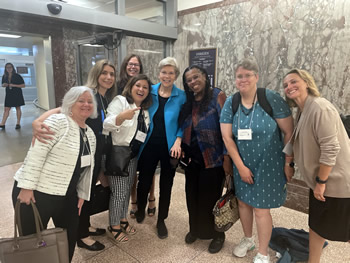
You never know who you will meet while in DC.
The U.S. Department of Education provided updates with highlighted
sessions from the Office of English Language Acquisition (OELA) and the Office
of Career, Technical, and Adult Education (OCTAE). Deputy secretary and
director of OELA Montserrat Garibay inspired attendees on the secretary of
education’s vision for MLEs through the Raise
the Bar for Multilingualism program, which included highlights on
important dates affecting public education and the numerous resources available
through OELA in support of educators, learners, and their families. OCTAE Management
and Program Analyst Domminck
McParland provided an overview of initiatives through the Adult
Education and Family Literacy Act, including important data on participants and
impact across the United States.
Prior to the heartfelt and inspirational keynote from Kia Johnson,
director of PreK–12 Language and Literacy at the Center for Applied
Linguistics, attendees heard from Roger Rosenthal, executive director of the
Migration Legal Action Program on the rights of immigrants and English learners
in public education. Attendees then chose between two separate sessions on
policy and advocacy for newcomers, one for pre-K–12 and the other for adult
education. These sessions were led by Margie McHugh, director of the National
Center on Immigrant Integration Policy at the Migration Policy Institute; Julie
Sugarman, senior policy analyst for PreK–12 Education at the Migration Policy
Institute; and Xinolin Cruz-Gonzalez, deputy director of Californians
Together.
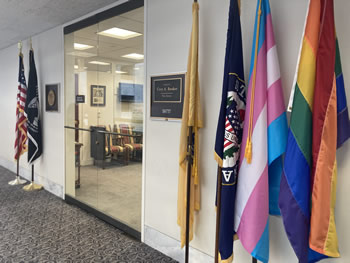
New Jersey pride.
The afternoon ended with a question-and-answer session with three
staffers from the offices of Representatives Adriano Espaillat, Nikema
Williams, and Brian Fitzpatrick. During this session, the staffers had an
impromptu request to role-play a Hill Visit, and they handled it perfectly,
giving attendees, many of whom were on the Hill for the first time, a glimpse
into the expectations for presenting the issues to their members of Congress.
The evening ended with a reception, at which the Center for Applied Linguistics
raffled off two professional development opportunities.
The next day, TESOLers hit the Hill.
Representing more than 25 states and carrying issue briefs along with
data on their own programs and communities, attendees had more than 100 visits
at which they presented the issue or policy, framed the impact, told their
stories, and made their asks.
While most of the visits were with legislative staffers who work with
education policy, several attendees were able to meet directly with their
members of Congress, and sometimes these meetings were impromptu visits in the
halls of the congressional offices. At one such encounter, several TESOLers
found Senator Elizabeth Warren traversing the hall, and, in true TESOL fashion,
a party ensued as they all gathered around for pictures. Even when the member
was not one that an attendee may have supported, they followed the mantra that
education was indeed and truly is a bipartisan issue—regardless of which side
of the aisle a member may reside.
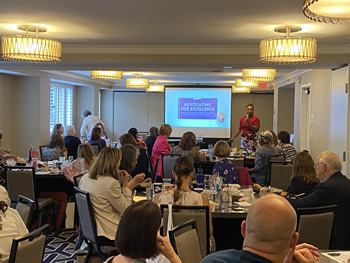
Keynote Kia Johnson energizing for advocacy.
Advocacy was on full display during the summit and continues each day.
As educators, advocacy is inherently ingrained in what we do—whether in the
classroom for the needs of a student well beyond any demands of the curriculum,
in the community for the rights and access of families, on our
own campuses to advance professionalism and scholarship, or, as evidenced at
TESOL’s 2023 Advocacy & Policy Summit, exercised in the direct
constitutional right of petitioning the government.
Continue in your advocacy today. TESOL has numerous resources
available at www.tesol.org/advocacy,
and you too can join in advocating for the federal priorities by taking action
today through TESOL’s Advocacy
Action Center.
If you have any questions on advocacy or would like additional
information on how TESOL can support advocacy where you are, please contact us
today at advocacy@tesol.org.
TESOL Blogs
Interested in writing a blog for TESOL?
Read the submission guidelines and send us your post!
Check out some of the most recent TESOL Blogs:
|
3 Strategies to Reflect on Our Biases, by Naashia Mohamed
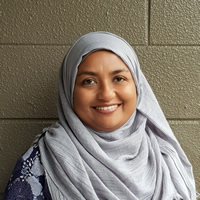
Some time ago, I facilitated a faith-based workshop for a group of multilingual women from different ethnic backgrounds. English was our lingua franca, but I wanted to end our session with a prayer in Arabic. During a break in our programme, I approached Seema, a participant I knew was an Arabic speaker. She was older than the rest of the group, and well respected by others. Assuming she would be perfect for this task, I asked if she would be comfortable leading us in the prayer to end our session. She agreed. Read more. |
|
4 Ways of Combating “PD Amnesia”, by Laura Baecher
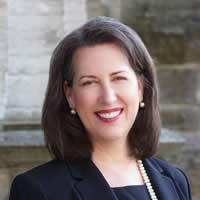
In this blog series, I have emphasized the need to make professional development (PD) more creative, more teacher-led, and more tied to local concerns. One of the other aspects too often neglected in PD is seeing the follow-on/up/through to teachers’ actual practices post-PD. And not just the week after, but weeks or even months afterwards.
We all have those treasured activities that we picked up from a PD experience which we are excited to try out right away in the classroom. These often become sparks that yield a whole set of variations and even shift our mindsets about approaches we hope to take up in our ever-emerging teacher identities. Read more. |
|
When Multilingual Learners Refuse to Speak Their Home Language, by Judie Haynes
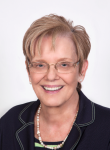
Over the years, I have taught many multilingual learners (MLs) who resisted speaking their home language as they became proficient in English. I remember well one student, Kenji Matsuyama. Kenji was born in the United States shortly after his family arrived from Japan for his father to take a new job. He was a native speaker of English by the time he started school in kindergarten. After third grade, Kenji no longer wanted to speak Japanese at all. He asked his parents to not speak Japanese in school or in front of his friends. He was proud to be the only American-born member of his family. Read more. |
TESOL Bookstore

Featured Resources from TESOL Press
ELT Basics is an invaluable resource for those seeking a straightforward, practical, and foundational understanding of English language teaching. This book covers a broad range of important topics, such as what it means to “know” a language, how people learn new languages, and what teachers can do to teach English effectively. Whether you’re looking for a basic understanding of ELT or considering a career in language teaching but want to know more first, this book will teach you about language acquisition as well as how to plan, instruct, and assess multilingual learners of English.
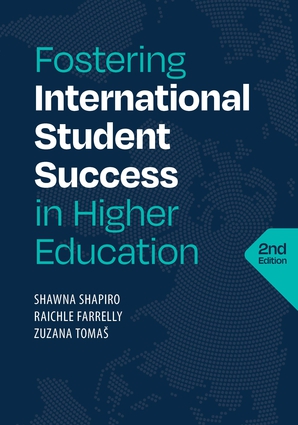 Fostering International Student Success in Higher Education, Second Edition
Fostering International Student Success in Higher Education, Second Edition
Shawna Shapiro, Raichle Farrelly, Zuzana Tomaš
(Copublished by TESOL and NAFSA)
The increase in the number of international students attending English-dominant schools brings benefits as well as challenges for institutions. Shapiro, Farrelly, and Tomaš provide a lively, informative discussion that answers the questions instructors commonly ask when seeking to ensure success for these students: What do I do to help students be successful in U.S. academic culture? How can I ensure that the content for my course is comprehensible to students who are still learning English? How do I design assignments and assessments that are fair while still acknowledging the difficulty of doing academic work in a second or foreign language? How might I treat international students as a linguistic and cultural asset in the classroom, and help them to become institutionally integrated?
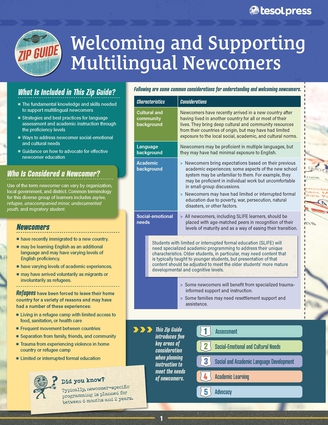 TESOL Zip Guide:
TESOL Zip Guide:
Welcoming and Supporting Multilingual Newcomers
Amber Warren, Melissa Hauke, Jan By Ying Hui-Michael, Adrienne Johnson
Newcomers are students who have recently immigrated to a new country, may be learning English as an additional language, and may have varying levels of English proficiency. This guide introduces five key areas of consideration when planning instruction to meet the unique social-emotional, linguistic, cultural, academic, and programming needs of multilingual learners of English who are newcomers. It includes strategies and best practices for language assessment and academic instruction through the proficiency levels, and guidance on how to advocate for effective newcomer education.